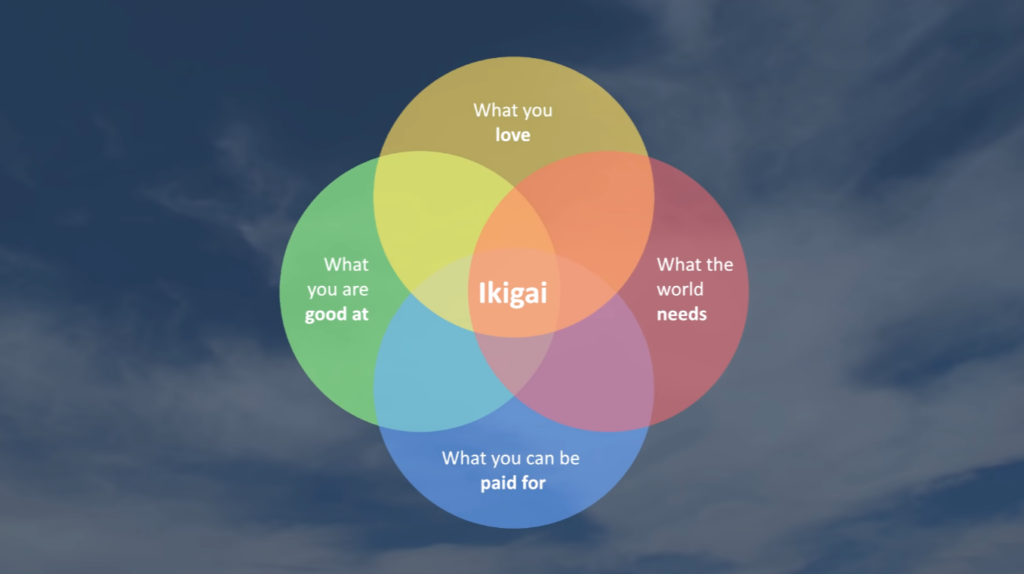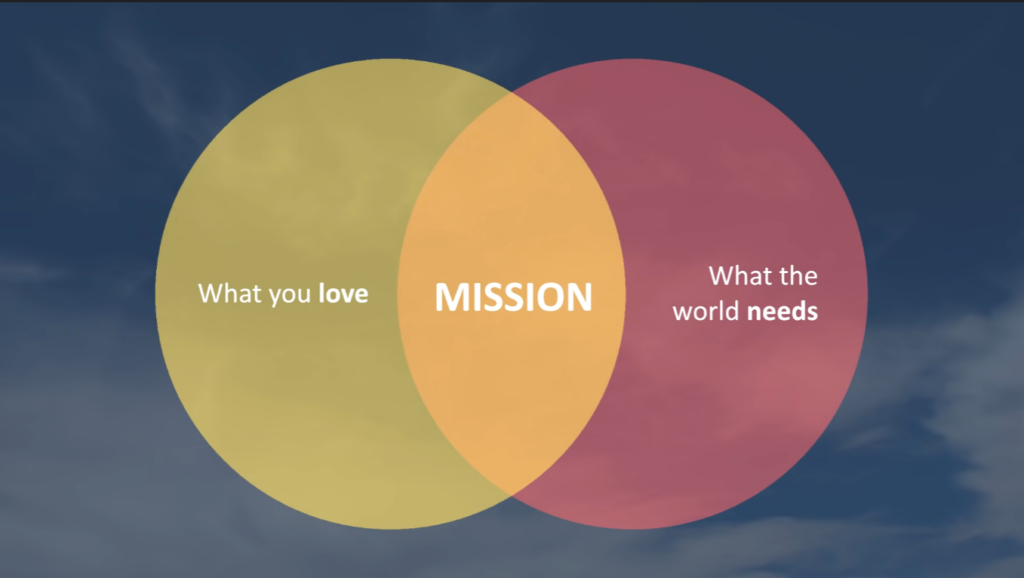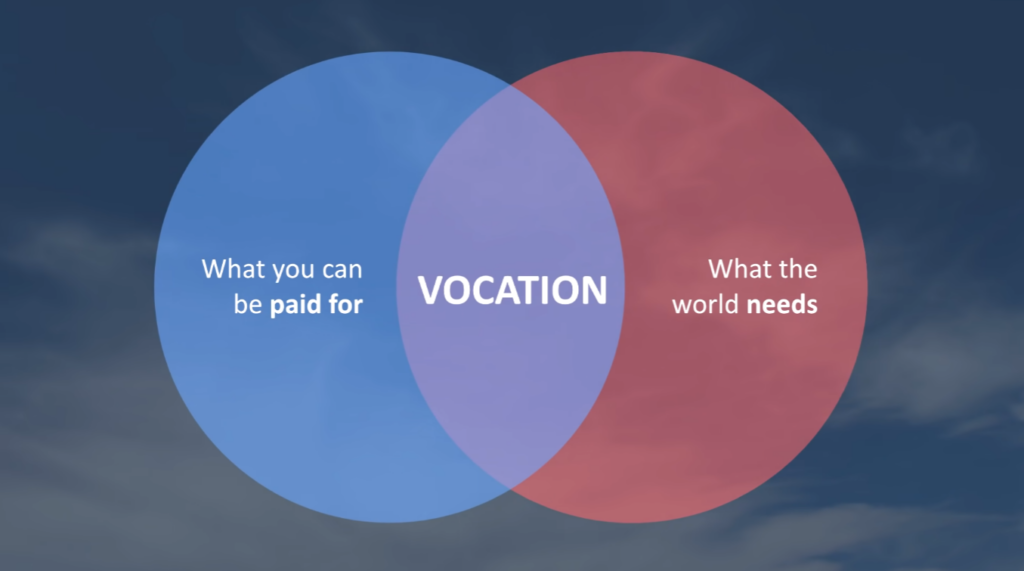We all want to be happy, but most of us have no idea what to do. Should we focus on making more money? Is pursuing our passions the most important? Should we give up all of our material possessions and become a monk in the mountains? Everyone seems to have a different take on it, so in this blog, we’ll give a definite answer by showing a proven formula that has been around for hundreds and hundreds of years; Ikigai.
Ikigai Meaning
The Japanese concept called Ikigai, which roughly translates into a reason for being, states that in order for you to be happy in life, you need to have a purpose for being here. To achieve Ikigai you need to check off four components, and without all four, you will never truly be happy.

- Do Something You Love
- Do Something the World Needs
- Do Something that Pays Well
- Do Something You’re Good at
Do Something You Love
The first component of Ikigai is that the thing you do needs to be something that you love.
We all have things that make us feel good and allow us to be present and aware of what’s happening right now. The more technical people will call this flow state, but most call it love. That’s why so many of us enjoy the art of drawing, dancing, singing, and reading. It takes us into a state of bliss where we feel good and are focused on the task in front of us.
That’s why some of us fall in love with one another. Being with that person allows us to forget all the other life problems, at least momentarily. I don’t need to get into too much detail about this component because we know in our gut when we genuinely love to do something, it’s a feeling that we humans all share.
Do Something the World Needs
The second component for Ikigai is a little bit more tricky. It states that whatever we do, it needs to be something that the world needs. We’ve been hardwired to feel good when we know we’re necessary for a community.
When we were hunters and gatherers, this was easy everyone played an important part. The cook was just as crucial as the hunter, and the builder was just as important as the caretaker. Back then, whenever you put in work, you could see the immediate positive effects your efforts had on others.
This isn’t the case nowadays. Most of us work in offices, taking minor roles in a massive company where even if we work our butts off, it’s hard to see our work’s positive effects on the rest of the world. It feels like our work isn’t really helping anyone, and if we quit our jobs one day, no one would even care because nothing would change.
You need to find something you can do that will create a visibly positive effect on those around you.
Do Something that Pays Well
The third component for Ikigai is that it needs to be something that you can get paid well for.
Right out the gate, many people will automatically believe that you don’t need money to be happy. However, let’s be real money is what puts a roof over your head, food in your mouth, and clothes on your body. Without enough of it, you’re going to spend most of your time stressed out of your mind wondering how you will get by. It’s not enough to make money; you need to get paid well enough to live a comfortable life.
The amount of money you need depends on where you live. For example, in some countries, you could live like a king off of 30,000 USD a year, but in New York City, that would barely be enough to cover your rent.
If you’re not making enough money to live without stress, you will never achieve happiness.
Do Something You’re Good At
The fourth and final component you need to have to achieve Ikigai is doing something you’re good at. This doesn’t mean that you need to be born with talent. It means you put in the time and effort to improve the skill.
Let’s say, for example, you want to become a motivational speaker. When you first get started, you’re terrible; you have stage fright, and you forget what you’re supposed to say. But over time, as you practice more and more, you start to overcome these obstacles, and you begin getting applause from the audience. That’s what it means to be good at something, not to be good from the get-go but to overcome obstacles and improve at this skill.
Overcoming obstacles creates a very fulfilling feeling inside of you which is why it’s such a crucial component of Ikigai.
Measuring your Ikigai Progress
The exciting thing about Ikigai is that you can tell where you are in life and what you need to work on by looking at the components you have so far.
Passion

If all you have is something that you love and are good at, then you have a passion. All aspiring singers and aspiring artists fall into this category. The main thing stopping you from being happy is that you aren’t getting paid enough for your skills; nobody seems to notice your talent.
If you find yourself in this category, you need to focus on marketing yourself to start getting paid well.
Mission

On the other hand, if you have something you love and see how the world needs it, then you have what’s called a mission. A lot of people who fall into this category are amateur bloggers and activists who talk about things like saving the planet or going vegan. These are people who genuinely want to see positive change in the world. But, unfortunately, they aren’t good enough at public speaking, persuasion or writing to be able to convince people to join their cause.
If you’re in this category, you need to focus on getting better at your craft and figuring out how to convince people instead of just stating your opinion loudly.
Profession

If you’re someone who has something you get paid well for and are good at, then you have what most people in the world have: a profession. It’s that tedious nine-to-five job that pays the bills. What’s stopping you from happiness is that you don’t love your work or see how any of this can make a difference in the world.
If you find yourself in this category, you need to try out new things and figure out what you genuinely love doing.
Vocation

Finally, if you get paid well, and it’s something that you know can help the world, then you have what’s called a vocation. An excellent example of a vocation is professors; they get paid well, and their job positively affects the world. They’re raising the future generation, but they often fall into the bad habit of teaching the same things every year, which stalls their improvement.
If you find yourself in this category, the main thing you need to ensure is that you are constantly getting better at your job and continuously challenging yourself to improve.
9+ Tips to Improve Your Ikigai
Stay active
To improve your Ikigai you must stay mentally and physically active. A lot of people when they retire, they feel like they don’t have a purpose anymore because they’re not actively working.
You need to find ways to keep yourself active, both mentally and physically. This could be something as simple as taking up a new hobby or learning a new language.
Smile and laugh
Smiling and laughter are two of the best ways to instantly improve your mood. If you can find things in your life that make you genuinely happy, then you’re on the right track.
Be grateful for what you have
A lot of people focus on what they don’t have and what they want instead of being grateful for what they already have.
If you take the time to appreciate the good things in your life, you’ll be much happier.
Reconnect with nature
In today’s digital world, it’s easy to forget how important nature is. Reconnecting with nature can help you feel more grounded and can improve your mental well-being.
Surround yourself with good friends
The people you surround yourself with have a significant impact on your life. If you’re constantly around negative people, it’s going to be hard to be happy.
On the other hand, if you surround yourself with positive people who are doing things that inspire you, it’ll be much easier to find your Ikigai. These people will be there to constantly provide you with feedback and push you to be your very best.
Be passionate about what you do
The key to a happy and fulfilling life is to be passionate about what you do. If you’re not passionate about what you’re doing, you’ll never be able to find your Ikigai.
Live in the moment
One of the best pieces of advice is to live in the moment. Don’t dwell on the past or worry about the future, just focus on the present.
This can be difficult, but if you can learn to do it, you’ll be much happier.
Take it slow
You can’t find your Ikigai overnight. It’s a process that takes years of trial and error. The best way to find it is to take your time, experiment with different things and be patient.
Don’t fill your stomach
You need to be in touch with your hunger, both physical and mental. A lot of people try to fill their stomachs with food when they’re bored, and this leads to overeating.
The same goes for your mind; if you try to fill it with distractions, you’ll never be able to focus on what’s important.
Get in shape
Your physical health has a significant impact on your mental state. If you’re not in shape, it’s going to be hard to focus on what’s important.
You need to make sure you’re eating right and exercising regularly.
Closing Thoughts on the Meaning of Ikigai
In order to be truly happy with your life and achieve Ikigai, you need to be spending your time doing something that you love, that you can get better at, that pays well, and that the world needs. Without all four, you will always feel like you’re missing something inside of yourself.
The secret lies in establishing an optimal intersection between ourselves and our surroundings so that this pursuit becomes effortless. The Taoists call this Wu-Wei or the ‘effortless action.’
It’s essential to remember that one’s Ikigai isn’t set in stone. Many factors play a role in deciding what our Ikigai is. To achieve Ikigai, we must adapt and finetune our journey through a growth mindset in a constantly changing world.
